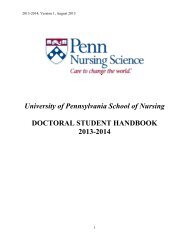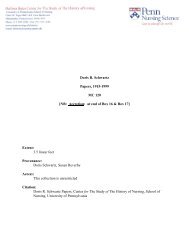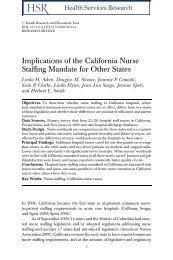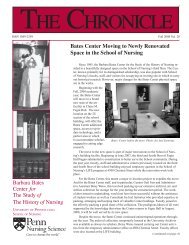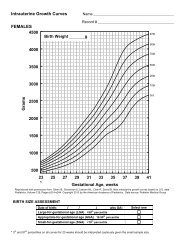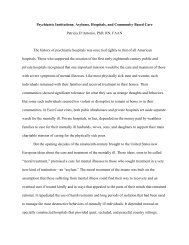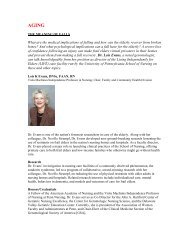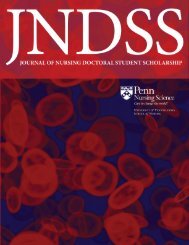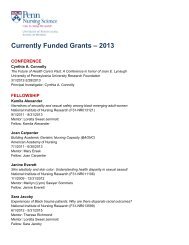Penn Nursing 090805_final_4c - University of Pennsylvania School ...
Penn Nursing 090805_final_4c - University of Pennsylvania School ...
Penn Nursing 090805_final_4c - University of Pennsylvania School ...
You also want an ePaper? Increase the reach of your titles
YUMPU automatically turns print PDFs into web optimized ePapers that Google loves.
Changing Cafeteria<br />
Portion Sizes to<br />
Prevent Weight Gain<br />
Stella L. Volpe<br />
PhD, RD, LD/N, FACSM<br />
Associate Pr<strong>of</strong>essor <strong>of</strong> <strong>Nursing</strong>, and Miriam<br />
Stirl Term Pr<strong>of</strong>essor in Nutrition<br />
In her research, Stella L.Volpe, PhD, RD,<br />
LD/N, FACSM, is taking aim at the<br />
“freshman fifteen” – the extra pounds<br />
that college freshman tend to gain when<br />
eating away from home for the first<br />
time.As the principal investigator <strong>of</strong> a<br />
National Institutes <strong>of</strong> Health grant, she is<br />
collaborating with a well-known northeastern<br />
university to study the effects <strong>of</strong><br />
reduced cafeteria portion sizes on body<br />
weight.This ongoing study is the first <strong>of</strong><br />
its kind to effect an environmental<br />
change in a college cafeteria setting.<br />
Such innovative thinking is one <strong>of</strong><br />
the reasons Dr.Volpe has been asked to<br />
serve as Assistant Director for Integrative<br />
Research for the new Institute for<br />
Diabetes, Obesity and Metabolism in<br />
the <strong>School</strong> <strong>of</strong> Medicine whose stated<br />
goal is “to bring together researchers<br />
from across campus to facilitate research<br />
among scientists, who may not have<br />
thought they had similar interests.This<br />
will be accomplished, in part, by hosting<br />
seminars so that scientists can discuss<br />
their research, which then will result in<br />
collaborations that focus on one or<br />
more <strong>of</strong> the core units <strong>of</strong> this institute.”<br />
“The ‘freshman fifteen’ is real,” says<br />
Dr.Volpe.“College cafeterias are ‘all<br />
you can eat.’There are plenty <strong>of</strong> temptations<br />
in the form <strong>of</strong> desserts and fried<br />
“The Institute for Diabetes, Obesity and Metabolism<br />
serves as an umbrella organization for all diabetesrelated<br />
activities at the <strong>University</strong> <strong>of</strong> <strong>Penn</strong>sylvania<br />
<strong>School</strong> <strong>of</strong> Medicine. It is anticipated that all research<br />
oriented members <strong>of</strong> the Institute will be actively<br />
involved in the programs sponsored by the Center,<br />
including use <strong>of</strong> core facilities, collaborative<br />
research initiatives, the annual retreat/Spring<br />
Symposium, and an ongoing Seminar Series<br />
sponsored by the Combined Division <strong>of</strong><br />
Endocrinology, Diabetes & Metabolism and the<br />
Institute for Diabetes, Obesity and Metabolism.”<br />
For more information, check the Institute’s website at<br />
http://www.med.upenn.edu/idom/int_research.html<br />
foods.Add to that the late night eating,<br />
calories from alcohol, a possible reduction<br />
in exercise routine, and it’s easy to<br />
see why freshman gain an average <strong>of</strong><br />
10 to 15 pounds during their first year<br />
<strong>of</strong> life on campus.”<br />
Dr.Volpe says that the persistent<br />
risk <strong>of</strong> the “freshman fifteen” is the<br />
propensity for students to develop eating<br />
patterns that endure long after<br />
graduation, contributing to the epidemic<br />
<strong>of</strong> obesity that is sweeping<br />
developed countries.“A small percentage<br />
<strong>of</strong> students take the extra weight<br />
<strong>of</strong>f after their freshman year,” she says,<br />
“but many continue to have trouble<br />
with unwanted weight gain.”<br />
The NIH study corresponds to Dr.<br />
Volpe’s overarching interest: changing the<br />
environment to prevent obesity.“It has<br />
been well documented that reducing<br />
portion size alone can lead to weight<br />
loss,” says Dr.Volpe.“We’re manipulating<br />
the environment to encourage healthier<br />
eating patterns.The college cafeteria setting<br />
is ideal for this purpose because it<br />
allows us to study the same students over<br />
time – something we’d be unable to do<br />
at a workplace cafeteria where patrons<br />
change daily.”<br />
Dr.Volpe’s interdisciplinary colleagues<br />
include John Jakicic, PhD, an<br />
exercise physiologist and Associate<br />
Pr<strong>of</strong>essor at the <strong>University</strong> <strong>of</strong> Pittsburgh<br />
as well as Director <strong>of</strong> the Physical<br />
Activity and Weight Management<br />
Research Center and Jean Anliker, PhD,<br />
RD,Associate Pr<strong>of</strong>essor <strong>of</strong> Nutrition and<br />
Director <strong>of</strong> the Nutrition Education<br />
Program at the <strong>University</strong> <strong>of</strong><br />
Massachusetts among others.They are<br />
Left to right: Mitch Lazar, PhD, MD,<br />
Director <strong>of</strong> the Institute for<br />
Diabetes, Obesity and Metabolism<br />
(IDOM); Ali N. Aji, MD, Director <strong>of</strong><br />
IDOM’s Type 1 Diabetes Unit; Tom<br />
Wadden, PhD, Director <strong>of</strong> the<br />
Obesity Unit; and Dr. Volpe, IDOM’s<br />
Assistant Director.<br />
comparing the body weights <strong>of</strong> freshman<br />
students who eat their meals at two<br />
separate campus cafeterias over a twosemester<br />
time period where portion sizes<br />
differ.<br />
Students will be monitored six different<br />
times over the course <strong>of</strong> the<br />
study to assess body weight, abdominal<br />
waist girth, and body fat, among other<br />
parameters. Each is matched to a student<br />
in the control group by gender,<br />
ethnicity, body weight, and activity levels.The<br />
study excludes students below<br />
or above their ideal weight range, those<br />
with chronic illnesses requiring specific<br />
eating patterns, and even those with a<br />
history <strong>of</strong> disordered eating such as<br />
anorexia nervosa or bulimia.<br />
Dr.Volpe posits that if the proposed<br />
intervention is successful, it will<br />
present an exciting opportunity to positively<br />
impact the health <strong>of</strong> students<br />
enrolled in 3,600 colleges and universities<br />
across the country.“We know that<br />
small diet and lifestyle changes can<br />
have a big impact on weight gain prevention,”<br />
says Dr.Volpe.“Even very<br />
small changes, like eliminating 100<br />
calories a day, and increasing activity to<br />
burn 100 calories a day – can make a<br />
big difference in preventing weight<br />
gain and reducing obesity.”<br />
Dr.Volpe is also a co-investigator<br />
on a large, multi-center trial to prevent<br />
type 2 diabetes mellitus in middle<br />
school children <strong>of</strong> low income.This<br />
study is being led by Dr. Gary Foster in<br />
the Weight and Eating Disorders<br />
Program at the <strong>University</strong> <strong>of</strong><br />
<strong>Penn</strong>sylvania <strong>School</strong> <strong>of</strong> Medicine.<br />
7





